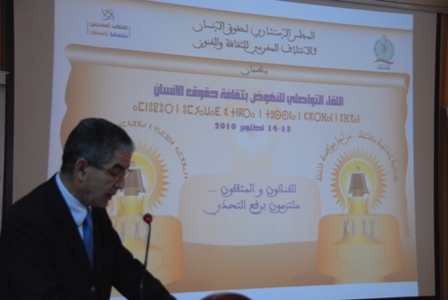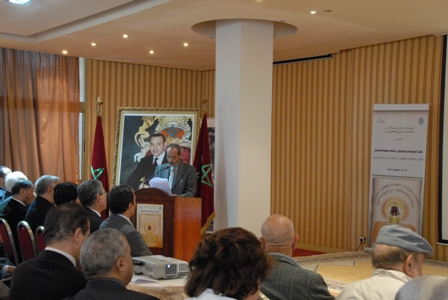ART SERVING HUMAN RIGHTS: FOR AN INDISSOLUBLE PARTICIPATION AND COMMITMENT TO PROMOTE HUMAN RIGHTS CULTURE
It was really an historic moment. The Advisory Council on Human Rights (CCDH), the Moroccan Coalition of Culture and Arts (CMCA) and the Rabita Mohamadia des Oulémas (Mohamadia League of Scholars) confirmed their commitment, in black and white, to promote human rights culture.
Indeed, the trio signed two partnership agreements at the information meeting organized by the Council and the Coalition on the theme: "A dynamic creativity for an active citizenship”.
A regulatory framework of two previous agreements signed between the Council and the Ministry of National Education, Higher Education, Staff Training and Scientific Research was signed during this meeting as well.
Speaking at this meeting, CCDH President, Mr. Ahmed Herzenni, said that the promotion of human rights culture is an educational and cultural project with a social dimension. It aims to influence attitudes and behaviors and requires participation of all stakeholders, he clarified.

This objective, Mr. Herzenni added, necessitates the mobilization all civil society, governmental and nongovernmental actors, including cultural and media stakeholders. He specified that this meeting comes within the framework of the implementation of the provisions of the Citizenship Platform for the Promotion of Human Rights Culture. The platform incorporates other activities including the preparation of a reference guide for the Promotion of Human Rights Culture, the organization of an annual national meeting on Human Rights and training for trainers in the field of human rights, he added.
For his part, Mr. Mohamed Derham, CMCA President, indicated that the Coalition aims, through its partnership with the Council, at an effective integration and participation of creators, intellectuals and artists in this historic process to promote human rights. He pointed out that it is an efficient contribution to the promotion of human rights culture, using cultural resources and artistic skills in various areas of artistic expression (music, cinema, theater, etc.).

This meeting was characterized by the presentation of a Charter for the promotion of human rights culture. This charter, adopted by the abovementioned signatories, aims to mobilize all governmental and non-governmental stakeholders to coordinate and amplify the current and future efforts to promote human rights culture and to work, supporting artistic creation, to ensure that all Moroccans are able to enjoy their rights and freedoms without discrimination.
Outlining this charter, Mr. Mohamed Abbadi, president of the organizing committee and president of CCDH’s Working Group on the promotion of human rights culture, indicated that the spirit of this charter can be summarized in four words: creation, support, implementation, and comprehensiveness.
Debate around this charter was enriched by the interventions of Rabiâa Naciri, a founding member of the Democratic Association of Moroccan Women (ADFM), Mr. Abdeslam Adrar, president of the National Forum to Fight Against Corruption, Mr. Abdelali Mestour, president of the Forum of Citizenship, Shahid Jamal, president of the Center of People’s Rights and Ms Touria Jabrane, artist and former minister of culture.
Each according to his/her field of activity, participants underlined that art is the best vehicle to convey and promote human rights culture. They stressed the need to go on with raising awareness efforts in the field of human rights in order "to think collectively to act effectively."
This event ended in triumph through the organization of an artistic evening party on Thursday, October 14, 2010. Nationally known artists took the stage of Mohammed V National Theatre to prove their commitment to promote human rights culture. Mohamed Derham, who sang the anthem of this event, entitled "Al ouajba," Archach Al Amazighia Band, Hamid El Kasri, Nabila Maâne, Nouâmane Lahlou, Said Mouskir, Nass Al Ghiouane and many other artists all expressed their wish to join this new dynamic.
Many political, cultural and civil society leaders were present during this event, in which winners in the competition of plastic arts were awarded. In addition to this competition, in which participated students of the School of Fine Arts (École Supérieure des Beaux Arts) and Casablanca Regional Center of Education (CPR), a photography show depicted the highlights of the Advisory Council on Human Rights.






















